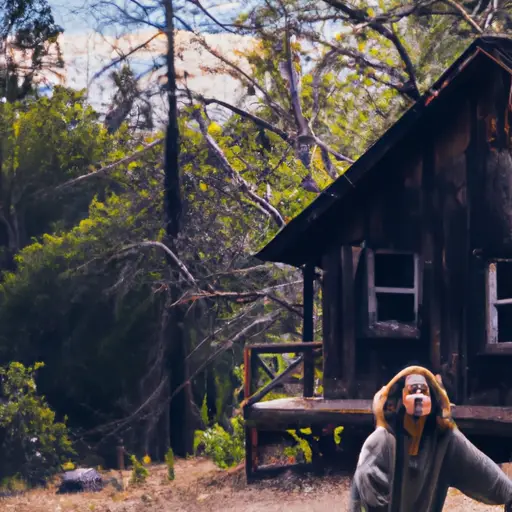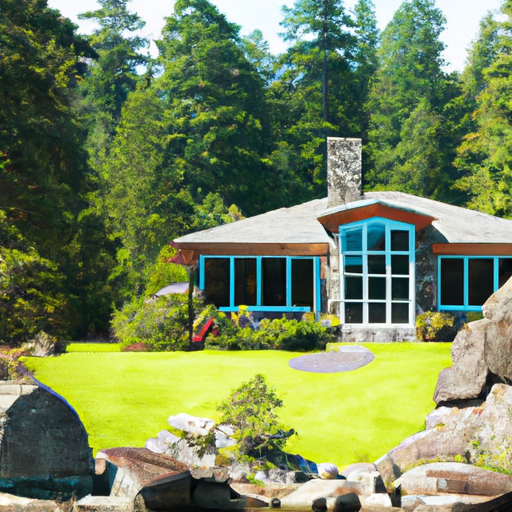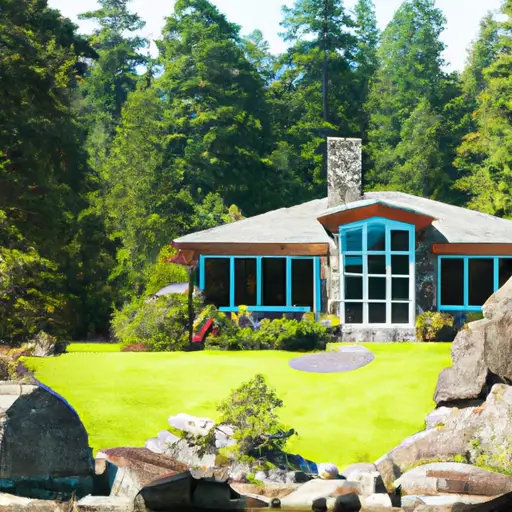So, have you ever wondered if it’s actually illegal to live off the grid in America? You know, disconnecting from the traditional power grid and relying on alternative sources of energy, like solar panels or wind turbines. Well, let me tell you, it’s an interesting topic to explore. In this article, we’ll dive into the details and find out whether or not living off the grid is actually against the law.
Living off the grid, it sounds like a dream, right? Breaking free from the constraints of society, embracing self-sufficiency, and reducing your carbon footprint. But you might be wondering, is it actually legal? Well, the answer is not as straightforward as one might think. While there are no federal laws that explicitly prohibit living off the grid, there are certain regulations and restrictions that vary from state to state and even within local jurisdictions.
In some areas, living off the grid can be perfectly legal and even encouraged. However, in other places, there might be restrictions regarding zoning regulations, building codes, or health and safety standards that make it more challenging to live self-sufficiently. It’s important to research and familiarize yourself with the local laws and regulations before embarking on an off-grid lifestyle.
In the upcoming article, we’ll explore some specific examples of states and regions where living off the grid is either welcomed or met with legal hurdles. We’ll also delve into the reasons behind these regulations and look at the potential consequences of living off the grid without complying with local laws. So, if you’re curious about this alternative way of living and want to know more about its legal implications, stay tuned! Living off the grid has become an increasingly popular lifestyle choice for many Americans in recent years. The idea of being self-sufficient, disconnected from the traditional utilities and systems, and living in harmony with nature holds a strong appeal for those seeking a simpler and more sustainable way of life. However, there are many questions and concerns surrounding the legality of off-grid living in America. In this article, we will explore the legal implications, building and construction regulations, energy and utilities, food and agriculture, self-sufficiency and survival skills, environmental considerations, financial and economic aspects, and social and community dynamics of living off the grid in America.

Defining Living off the Grid
Overview of living off the grid
Living off the grid refers to the lifestyle of living without reliance on public utilities, such as electricity, water, and sewage systems. It often involves generating your own power through renewable energy sources like solar panels or wind turbines, collecting rainwater or utilizing well water, and implementing sustainable practices for waste management and recycling.
What it means to live off the grid
Living off the grid means being entirely self-sufficient when it comes to utilities and resources. It requires individuals or communities to be proactive in generating their own electricity, managing their water supply, growing their own food, and minimizing their impact on the environment. While this lifestyle offers many benefits, such as freedom from utility bills and reduced environmental footprint, it also comes with unique challenges.
Benefits and challenges of living off the grid
Living off the grid can provide individuals with a sense of self-reliance, environmental stewardship, and independence. There are financial benefits as well, as off-grid living eliminates or significantly reduces utility bills. Additionally, off-grid living promotes a simpler and more sustainable lifestyle, which can have positive effects on mental and physical well-being.
However, living off the grid also presents challenges, such as initial setup costs for renewable energy systems, water conservation and management, and the need for self-sufficiency skills. It requires individuals to take responsibility for their own resources and adapt to a lifestyle that may be significantly different from the mainstream culture.
Legal Implications of Living off the Grid
Understanding the legality of off-grid living in America
The legality of living off the grid in America varies from state to state and even within different jurisdictions. While some areas have embraced off-grid living and enacted regulations to support it, others may have restrictions and zoning codes that make it challenging or even illegal.
Laws and regulations regarding off-grid living
It is important to research and understand the laws and regulations in your specific location before embarking on an off-grid lifestyle. These regulations may include requirements for obtaining permits, building codes, and compliance with certain safety standards. Additionally, zoning restrictions may limit the size, location, and use of off-grid dwellings.
Permits and zoning restrictions
Before building an off-grid home or making significant modifications to an existing property, it is crucial to obtain the necessary permits and comply with local zoning restrictions. These permits ensure that the construction or modifications meet safety standards, environmental regulations, and community guidelines.
Potential consequences of living off the grid illegally
Living off the grid without complying with the laws and regulations in your area can have serious consequences. These consequences may include fines, forced removal of the off-grid living setup, or legal action. It is essential to understand and respect the laws of your community to enjoy the benefits of off-grid living without facing legal issues.
Building and Construction Regulations
Building codes and compliance
When constructing off-grid homes or making modifications to existing structures, it is essential to adhere to building codes and compliance standards. Building codes are designed to ensure that buildings are structurally sound, safe to live in, and meet certain environmental and energy efficiency requirements.
Permits required for off-grid homes
Obtaining the proper permits for constructing or modifying off-grid homes is necessary in compliance with local regulations. These permits may require submitting building plans, meeting certain energy efficiency standards, and addressing environmental impact concerns.
Alternative construction methods and materials
Off-grid homes often employ alternative construction methods and materials to minimize environmental impact and achieve greater self-sufficiency. Techniques such as straw bale construction, earthbag construction, and tiny house construction are gaining popularity among off-grid enthusiasts.
Ensuring safety and sustainability in off-grid dwellings
While off-grid living allows for independence from traditional utility systems, it is crucial to ensure the safety and sustainability of off-grid dwellings. This includes implementing proper ventilation, fire safety measures, waste management systems, and maintaining a comfortable and livable environment.

Energy and Utilities
Generating and managing electricity off the grid
A key aspect of off-grid living is generating and managing your own electricity. This can be achieved through various renewable energy sources such as solar power, wind turbines, or hydropower. Battery storage systems are often used to store excess energy for use during periods of low generation.
Solar power and other renewable energy sources
Solar power is one of the most popular and reliable renewable energy sources for off-grid living. It involves installing solar panels that convert sunlight into electricity, which can power electrical appliances, lights, and other necessary devices. Other renewable energy sources, such as wind turbines or hydropower, can also be utilized depending on the local resources and conditions.
Water supply and wastewater treatment options
Living off the grid requires careful management of water supply and wastewater treatment. Collecting and storing rainwater, utilizing well water, or implementing water conservation techniques are common practices for off-grid living. Onsite wastewater treatment systems, such as composting toilets or septic systems, are necessary for proper waste management.
Navigating utility hookups and disconnections
When transitioning to an off-grid lifestyle, it is important to consider the process of disconnecting from traditional utility hookups, such as electricity, water, or sewage systems. Proper planning and consultation with experts can ensure a smooth and successful transition to off-grid living.
Food and Agriculture
Growing and sourcing food off the grid
One of the primary goals of off-grid living is achieving self-sufficiency in food production. This involves growing food in gardens or utilizing indoor farming techniques like hydroponics or aquaponics. Additionally, sourcing food locally from farmers’ markets or participating in community-supported agriculture can enhance self-sufficiency.
Permaculture and organic farming techniques
Permaculture and organic farming techniques are commonly employed in off-grid living to promote sustainable and regenerative practices. These techniques focus on building healthy soil, enhancing biodiversity, and minimizing the use of synthetic inputs, while maximizing the use of natural resources and ecological processes.
Raising livestock and poultry
In addition to growing vegetables and fruits, raising livestock and poultry can contribute to a more self-sufficient off-grid lifestyle. Chickens, for example, can provide eggs and pest control, while goats or cows can produce milk and meat. However, it is important to consider the space requirements, local regulations, and animal welfare aspects when raising livestock.
Food preservation and self-sufficiency
Off-grid living often involves preserving food for longer-term storage and self-sufficiency. Techniques such as canning, dehydrating, fermenting, or root cellaring enable individuals to preserve excess harvest or store food for extended periods without relying on refrigeration or electricity.
Self-Sufficiency and Survival Skills
Developing essential self-sufficiency skills
Off-grid living requires individuals to develop a range of self-sufficiency skills to manage their daily needs. These skills may include gardening, food preservation, basic carpentry, plumbing, electrical work, and even first-aid and emergency response techniques.
Emergency preparedness and survival knowledge
Living off the grid often involves being prepared for emergencies or natural disasters. This necessitates knowledge and skills in emergency response, first-aid, and self-defense. Creating emergency plans, stockpiling essential supplies, and learning survival skills are crucial aspects of off-grid living.
Basic healthcare and first aid in off-grid living
In off-grid living situations, access to medical facilities and healthcare professionals may be limited. It is important to acquire basic healthcare knowledge, keep a well-stocked first-aid kit, and have a good understanding of common ailments and treatments.
Building communities and networks
While off-grid living can provide solitude and independence, building communities and networks is essential for sharing skills, resources, and support. Engaging in local off-grid communities, online forums, or attending workshops and events can foster connections and help overcome challenges inherent in off-grid living.
Environmental Considerations
Reducing environmental impact in off-grid lifestyles
One of the primary motivations for off-grid living is to reduce environmental impact. Implementing energy-efficient practices, utilizing renewable energy sources, conserving water, and minimizing waste can significantly reduce the ecological footprint of off-grid dwellings.
Waste management and recycling strategies
Proper waste management and recycling strategies are essential in off-grid living. Composting organic waste, recycling as much as possible, and reducing packaging waste can significantly minimize the environmental impact of off-grid lifestyles.
Conservation practices for water and energy
Conserving water and energy is crucial in off-grid living, as the availability of these resources may be limited or require extra effort to obtain. Implementing water-saving techniques, using energy-efficient appliances, and prioritizing natural lighting and ventilation can contribute to sustainable off-grid living.
Preserving natural habitats and biodiversity
Living off the grid often means residing in or near natural habitats and diverse ecosystems. It is essential to prioritize the preservation and conservation of these areas, respecting local flora and fauna, and practicing responsible land management.
Financial and Economic Aspects
Costs and financial considerations of off-grid living
While off-grid living can bring financial benefits in the long run, there are initial costs associated with setting up an off-grid system. These costs may include purchasing solar panels, water collection systems, or investing in alternative construction methods. It is essential to carefully consider and budget for these expenses.
Earning income and generating livelihoods off the grid
Living off the grid does not necessarily mean disconnecting from earning income or generating livelihoods. Many off-grid enthusiasts engage in remote work, freelance opportunities, or developing micro-enterprises that align with their values and skills. It is important to explore and plan for income-generating activities that can support your off-grid lifestyle.
Bartering and alternative economies
Living off the grid often opens up opportunities for bartering and participating in alternative economies. This can involve exchanging goods and services with neighbors, trading with local farmers, or participating in community exchange systems. Bartering and alternative economies contribute to the self-sufficiency and resilience of off-grid communities.
Sustainability and long-term affordability
When considering an off-grid lifestyle, it is important to assess its long-term affordability and sustainability. Evaluating the costs and benefits, creating a realistic budget, and continually reviewing and adjusting your off-grid systems and practices ensure that the lifestyle remains financially and economically viable.
Social and Community Dynamics
Challenges and benefits of off-grid community living
Off-grid community living presents both challenges and benefits. While it can foster a strong sense of community, shared values, and mutual support, it also requires navigating interpersonal dynamics, decision-making processes, and conflict resolution within a close-knit community.
Conflict resolution and decision-making
Living in an off-grid community often involves making collective decisions and solving conflicts in a collaborative manner. Establishing clear communication channels, respectful dialogue, and implementing consensus-based decision-making processes can contribute to harmonious and resilient off-grid communities.
Education and socialization in remote areas
Off-grid living in remote areas can pose challenges when it comes to education and socialization, especially for families with children. Developing homeschooling curricula, organizing community learning events, and utilizing online educational resources can provide alternatives to traditional schooling.
Creating networks and support systems
Living off the grid can be isolating at times, especially in remote or rural areas. Creating networks and support systems with like-minded individuals, participating in off-grid communities or workshops, and staying connected through online platforms can help overcome feelings of isolation and foster a sense of belonging.
Conclusion
Weighing the legality and practicality of living off the grid
Living off the grid can be an appealing lifestyle choice, offering independence, sustainability, and a closer connection to nature. However, it is important to consider the legal implications and practicalities before embarking on an off-grid journey.
Balancing personal freedom with legal responsibilities
While it is essential to embrace personal freedom and self-sufficiency, it is equally important to operate within the legal boundaries of your community. Understanding and respecting local laws, obtaining necessary permits, and complying with building codes and regulations ensures a harmonious off-grid lifestyle.
Considering individual circumstances and resources
Experiences of living off the grid can vary greatly depending on individual circumstances and available resources. Conducting thorough research, considering financial capabilities, assessing skill sets, and being realistic about the challenges and benefits are crucial steps in determining if an off-grid lifestyle is suitable for you.
Final thoughts on off-grid living in America
Living off the grid in America can be both a rewarding and challenging lifestyle. It offers individuals the potential for self-sufficiency, sustainability, and a closer connection to nature. However, it is important to carefully navigate the legal implications, building and construction regulations, energy and utility systems, food and agriculture practices, self-sufficiency and survival skills, environmental considerations, financial and economic aspects, and social and community dynamics associated with this lifestyle choice. Ultimately, making an informed decision based on your values, resources, and circumstances is crucial in embarking on a successful off-grid living journey.




